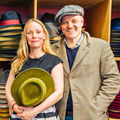Interviews
New UGA technology makes textiles permanently germ-free
07 Jul '11
3 min read
A University of Georgia researcher has invented a new technology that can inexpensively render medical linens and clothing, face masks, paper towels and yes, even diapers, intimate apparel and athletic wear, including smelly socks permanently germ-free.
The simple and inexpensive anti-microbial technology works on natural and synthetic materials. The technology can be applied during the manufacturing process or at home, and it doesn't come out in the wash. Unlike other anti-microbial technologies, repeated applications are unnecessary to maintain effectiveness.
“The spread of pathogens on textiles and plastics is a growing concern, especially in healthcare facilities and hotels, which are ideal environments for the proliferation and spread of very harmful microorganisms, but also in the home,” said Jason Locklin, the inventor, who is an assistant professor of chemistry in the Franklin College of Arts and Sciences and on the Faculty of Engineering.
The anti-microbial treatment invented by Locklin, which is available for licensing from the University of Georgia Research Foundation, Inc., effectively kills a wide spectrum of bacteria, yeasts and molds that can cause disease, break down fabrics, create stains and produce odors.
According to the Centers for Disease Control and Prevention, approximately one of every 20 hospitalized patients will contract a healthcare-associated infection. Lab coats, scrub suits, uniforms, gowns, gloves and linens are known to harbor the microbes that cause patient infections.
Consumers' concern about harmful microbes has spurred the market for clothing, undergarments, footwear and home textiles with antimicrobial products. But to be practical, both commercial and consumer anti-microbial products must be inexpensive and lasting.
“Similar technologies are limited by cost of materials, use of noxious chemicals in the application or loss of effectiveness after a few washings,” said Gennaro Gama, UGARF senior technology manager. “Locklin's technology uses ingeniously simple, inexpensive and scalable chemistry.”
Gama said the technology is simple to apply in the manufacturing of fibers, fabrics, filters and plastics. It also can bestow antimicrobial properties on finished products, such as athletic wear and shoes, and textiles for the bedroom, bathroom and kitchen.
“The advantage of UGARF's technology over competing methods,” said Gama, “is that the permanent antimicrobial can be applied to a product at any point of the manufacture-sale-use continuum. In contrast, competing technologies require blending of the antimicrobial in the manufacturing process.”
“In addition,” said Gama, “If for some reason the antimicrobial layer is removed from an article through abrasion, for example it can be reapplied by simple spraying.”
Other markets for the anti-microbial technology include military apparel and gear, food packaging, plastic furniture, pool toys, medical and dental instrumentation, bandages and plastic items.
The simple and inexpensive anti-microbial technology works on natural and synthetic materials. The technology can be applied during the manufacturing process or at home, and it doesn't come out in the wash. Unlike other anti-microbial technologies, repeated applications are unnecessary to maintain effectiveness.
“The spread of pathogens on textiles and plastics is a growing concern, especially in healthcare facilities and hotels, which are ideal environments for the proliferation and spread of very harmful microorganisms, but also in the home,” said Jason Locklin, the inventor, who is an assistant professor of chemistry in the Franklin College of Arts and Sciences and on the Faculty of Engineering.
The anti-microbial treatment invented by Locklin, which is available for licensing from the University of Georgia Research Foundation, Inc., effectively kills a wide spectrum of bacteria, yeasts and molds that can cause disease, break down fabrics, create stains and produce odors.
According to the Centers for Disease Control and Prevention, approximately one of every 20 hospitalized patients will contract a healthcare-associated infection. Lab coats, scrub suits, uniforms, gowns, gloves and linens are known to harbor the microbes that cause patient infections.
Consumers' concern about harmful microbes has spurred the market for clothing, undergarments, footwear and home textiles with antimicrobial products. But to be practical, both commercial and consumer anti-microbial products must be inexpensive and lasting.
“Similar technologies are limited by cost of materials, use of noxious chemicals in the application or loss of effectiveness after a few washings,” said Gennaro Gama, UGARF senior technology manager. “Locklin's technology uses ingeniously simple, inexpensive and scalable chemistry.”
Gama said the technology is simple to apply in the manufacturing of fibers, fabrics, filters and plastics. It also can bestow antimicrobial properties on finished products, such as athletic wear and shoes, and textiles for the bedroom, bathroom and kitchen.
“The advantage of UGARF's technology over competing methods,” said Gama, “is that the permanent antimicrobial can be applied to a product at any point of the manufacture-sale-use continuum. In contrast, competing technologies require blending of the antimicrobial in the manufacturing process.”
“In addition,” said Gama, “If for some reason the antimicrobial layer is removed from an article through abrasion, for example it can be reapplied by simple spraying.”
Other markets for the anti-microbial technology include military apparel and gear, food packaging, plastic furniture, pool toys, medical and dental instrumentation, bandages and plastic items.
Popular News
Leave your Comments
Editor’s Pick
Jason Kent
British Textile Machinery Association (BTMA)
Alex and Zofia Torun-Shaw
Brand - Laird Utility
































-Ltd..jpg?tr=w-120,h-60,c-at_max,cm-pad_resize,bg-ffffff)





.jpg?tr=w-120,h-60,c-at_max,cm-pad_resize,bg-ffffff)
.jpg?tr=w-120,h-60,c-at_max,cm-pad_resize,bg-ffffff)






